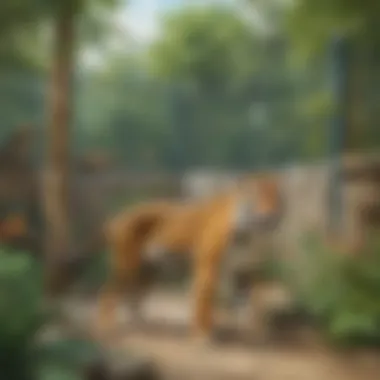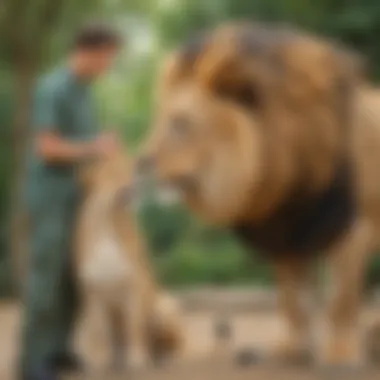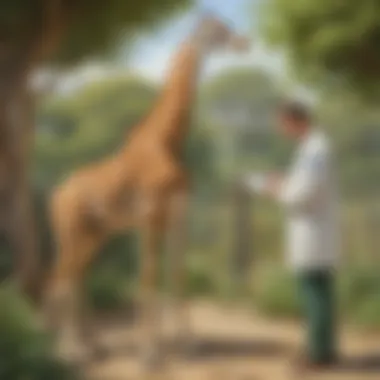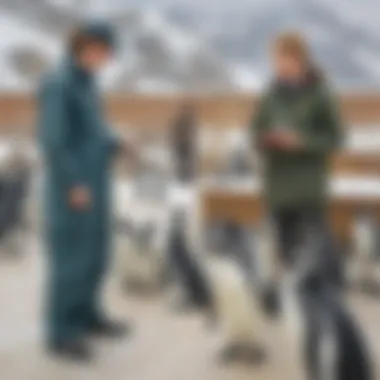Becoming a Zookeeper: Your Path to Animal Care Mastery


Science Fun Facts
As you embark on the journey of becoming a zookeeper, it's fascinating to delve into some interesting trivia and facts about the animal kingdom. Did you know that a group of flamingos is called a 'flamboyance'? Or that elephants can communicate with each other through infrasound, which is below our hearing range? Exploring these quirky science stories can spark curiosity and deepen your appreciation for the wonders of wildlife.
Discover the Wonders of Science
Delve deeper into the scientific concepts that form the foundation of animal care and conservation. Educational videos and animations can illuminate complex topics such as animal behavior, habitat preservation, and species diversity. By immersing yourself in interactive learning tools, you can grasp the real-life applications of science in managing zoological environments and promoting biodiversity.
Science Quiz Time
Engage your mind with interactive quizzes tailored to test your knowledge of zoology and wildlife conservation. From multiple-choice questions that challenge your understanding of animal anatomy to brain teasers that prompt critical thinking on environmental stewardship, these puzzles offer a fun and insightful way to enhance your learning experience. Embrace gamification as a tool for deepening your grasp of scientific principles and fostering a spirit of curiosity.
Science Experiment Showcase
Explore fun and engaging experiments that mirror the practical aspects of caring for animals in captivity. Step-by-step instructions guide you through hands-on activities, using a materials list to ensure you have the necessary supplies for safe experimentation. Remember to adhere to safety tips and precautions to protect both yourself and the animals under your care, fostering a culture of responsible and conscientious animal stewardship.
Introduction to Zookeeping
Zoos play a crucial role in wildlife conservation and education, making a significant impact on society. This section provides a foundational understanding of the multifaceted world of zookeeping. Delving into the daily responsibilities, career opportunities, and challenges, it sets the stage for aspiring animal care specialists.
Understanding the Role of a Zookeeper
Responsibilities and Duties
The responsibilities and duties of a zookeeper are central to maintaining the well-being of the animals under their care. These dedicated professionals are responsible for feeding, monitoring health, and ensuring enriching environments for the animals. Their commitment to animal welfare sets them apart, reflecting a deep passion for conservation efforts.
Importance of Animal Welfare
Emphasizing the significance of animal welfare within zoo settings, this aspect underscores the ethical considerations at the core of zookeeping. Prioritizing the physical and mental health of animals, zookeepers contribute to species preservation and public awareness. Upholding high standards of care, they serve as advocates for animal well-being.
Career Prospects in Zookeeping
Job Opportunities
The field of zookeeping offers a diverse range of job opportunities, from animal care to conservation management. Zookeepers have the chance to work closely with various species, contributing to research, education, and preservation initiatives. This dynamic environment presents exciting prospects for those passionate about wildlife.
Salary Expectations
While salaries may vary based on experience and location, zookeeping offers competitive remuneration, reflecting the value placed on animal care specialists. Compensation packages often include benefits such as healthcare and retirement plans, acknowledging the demanding yet rewarding nature of zookeeping.
Passion for Animals: A Prerequisite
Personal Qualities Required


A deep-rooted love for animals is a fundamental requirement for aspiring zookeepers. Compassion, patience, and empathy are essential qualities that enable zookeepers to form meaningful connections with the wildlife in their care. These personal attributes form the foundation of a successful career in animal husbandry.
Challenges Faced
Navigating the challenges of zookeeping demands resilience and problem-solving capabilities. From handling emergencies to addressing behavioral issues, zookeepers encounter diverse obstacles in their daily routines. By overcoming these challenges, they enhance their skills and dedication to animal welfare.
Educational Requirements
In the intricate world of zookeeping, educational requirements stand as a cornerstone for those wishing to pursue a career dedicated to caring for animals. Understanding the fundamental importance of education in this field is crucial. Education provides aspiring zookeepers with essential knowledge, skills, and qualifications necessary to thrive in their roles. From learning about animal behavior to acquiring hands-on training, educational requirements lay a robust foundation for a successful career in animal care and conservation.
Academic Qualifications
Recommended Degrees
Recommended degrees play a pivotal role in shaping the expertise and competence of future zookeepers. These specialized degrees offer in-depth knowledge in areas such as biology, zoology, and animal sciences, aligning perfectly with the requirements of a zookeeper's role. Pursuing a recommended degree ensures a comprehensive understanding of animal anatomy, physiology, and behavior, essential for effective animal care. The interdisciplinary nature of these degrees equips individuals with a diverse skill set, enabling them to address various challenges in animal welfare efficiently. While these degrees demand dedication and hard work, the rewards are immense, paving the way for a fulfilling and impactful career in zookeeping.
Certifications and Courses
Certifications and courses serve as valuable assets for aspiring zookeepers keen on enhancing their career prospects. These specialized programs offer focused training on aspects like wildlife conservation, animal husbandry, and species-specific care protocols. By acquiring relevant certifications and attending specific courses, individuals can demonstrate their commitment to continuous learning and skill development. Moreover, these certifications act as tangible proof of a zookeeper's expertise and dedication to the field, setting them apart in a competitive job market. While pursuing certifications and courses requires dedication and investment, the long-term benefits in terms of career advancement and specialization make them a wise choice for individuals seeking to excel in the field of zookeeping.
Specialized Knowledge
Biology and Zoology
A profound understanding of biology and zoology is indispensable for aspiring zookeepers striving to excel in their roles. Knowledge of these disciplines equips individuals with essential insights into animal physiology, anatomy, and ecological interactions, forming the bedrock of effective animal care. By diving deep into the nuances of biology and zoology, individuals gain a comprehensive understanding of evolutionary patterns, nutritional requirements, and habitat preferences of various species. This specialized knowledge not only enhances a zookeeper's decision-making abilities but also fosters a deeper appreciation for animal diversity, laying the groundwork for promoting conservation efforts in their professional sphere.
Animal Behavior Studies
Delving into the realm of animal behavior studies opens up a treasure trove of insights for zookeepers keen on understanding and addressing animals' psychological and emotional needs. Through focused studies on animal behavior, individuals gain invaluable knowledge on communication patterns, social dynamics, and stress indicators in different species. This expertise empowers zookeepers to tailor enrichment programs, behavioral training sessions, and habitat designs that cater to the unique preferences and requirements of the animals under their care. By leveraging insights from animal behavior studies, zookeepers can establish stronger connections with their animal charges, fostering trust, and enhancing overall well-being, thus underscoring the vital role of specialized knowledge in elevating the standard of animal care in a zookeeping context.
Gaining Practical Experience
Gaining practical experience is a pivotal aspect in the journey of individuals aspiring to become zookeepers. It provides hands-on learning opportunities that can't be achieved through academic study alone. Practical experience allows aspiring animal care specialists to apply theoretical knowledge in real-world settings, gaining valuable insights into the daily tasks and challenges faced by zookeepers.
Internships and Volunteering
Internships and volunteering play a significant role in gaining practical experience for future zookeepers. These opportunities offer direct interaction with animals, fostering a deeper understanding of their behavior and care needs. By learning from experienced professionals, participants can develop key skills and establish important connections within the zoological field.
Zoo Placement Programs
Zoo placement programs are structured opportunities that allow individuals to work closely with zoo animals under the guidance of seasoned zookeepers. Participants get firsthand experience in animal husbandry, observation, and enrichment activities. The immersive nature of zoo placements helps aspiring zookeepers develop a strong foundation in animal care and welfare principles, preparing them for future roles in zoos and wildlife conservation.
Wildlife Rehabilitation Centers
Wildlife rehabilitation centers provide another avenue for gaining practical experience in animal care. These centers focus on the rehabilitation and release of injured or orphaned wildlife, offering participants the chance to work directly with a variety of species. In this setting, aspiring zookeepers learn how to assess animal health, administer treatments, and contribute to conservation efforts through hands-on care.


Hands-On Training
In addition to internships and volunteering, hands-on training is essential for building practical skills in zookeeping. Such training often includes learning feeding and enrichment techniques, which are crucial for ensuring the wellbeing and mental stimulation of zoo animals. Equally important is the development of strong animal handling skills, which are necessary for safe interactions and medical procedures involving diverse animal species.
Feeding and Enrichment Techniques
Feeding and enrichment techniques form a fundamental part of zookeeping practices. Understanding animal nutrition and creating enrichment activities that mimic natural behaviors are essential for promoting animal health and happiness. Practicing these techniques during hands-on training sessions allows aspiring zookeepers to refine their abilities in enhancing the quality of life for the animals in their care.
Animal Handling Skills
Animal handling skills are vital for zookeepers to safely engage with animals during daily care routines and medical examinations. Proper handling techniques help reduce stress for both the animals and the personnel involved. Through hands-on training, individuals learn how to approach, restrain, and interact with different species, ensuring their welfare is always the top priority.
Building Essential Skills
In this comprehensive guide on becoming a zookeeper, the section on building essential skills holds paramount importance. These skills are the bedrock for success in the realm of animal care and conservation. Developing robust communication skills, problem-solving abilities, and attention to detail are instrumental in fostering a harmonious and efficient work environment within a zoo setting. These essential skills not only enhance the quality of animal care but also contribute to the overall visitor experience and conservation efforts.
Communication Skills
Interacting with Visitors
When it comes to the zookeeper profession, effective communication with visitors plays a crucial role. Zookeepers serve as ambassadors for the animal kingdom, conveying important messages about conservation, wildlife, and the role of zoos in education. Interacting with visitors provides an opportunity to inspire and educate people about the significance of animal welfare and environmental stewardship. Zookeepers must possess the ability to engage with a diverse audience, ranging from young children to seasoned wildlife enthusiasts, tailoring their communication style to ensure optimal understanding and impact.
Interacting with visitors not only fosters a sense of connection between the public and wildlife but also cultivates a deeper appreciation for the importance of conservation efforts. By sharing their knowledge and passion for animals, zookeepers can instill positivity and inspire change in visitor attitudes and behaviors toward nature and wildlife conservation.
Collaborating with Team Members
Collaboration among zookeeping staff is essential for the smooth operation of a zoo facility. Working as part of a team allows zookeepers to leverage their collective knowledge and experience, ensuring the well-being of the animals under their care. By collaborating effectively with colleagues, zookeepers can exchange valuable insights, problem-solving strategies, and best practices in animal care.
The ability to collaborate with team members also nurtures a supportive and cohesive work environment, where ideas can flourish, and challenges can be addressed collectively. Engaging in open communication, respecting diverse viewpoints, and fostering a culture of collaboration are key aspects of successful teamwork in a zoo setting.
Problem-Solving Abilities
Handling Emergencies
The capability to handle emergencies swiftly and decisively is a critical aspect of a zookeeper's skill set. In the dynamic environment of a zoo, unexpected situations may arise, requiring quick thinking and action to ensure the safety of both animals and staff. Zookeepers must undergo rigorous training to prepare for emergency scenarios, such as animal escapes, medical crises, or natural disasters.
Effective emergency response not only mitigates risks but also showcases the professionalism and dedication of zookeeping staff. By mastering the art of crisis management, zookeepers demonstrate their commitment to animal welfare and safety, earning the trust and respect of their colleagues and the public.
Resolving Animal Behavior Issues
Understanding and addressing animal behavior issues is a fundamental aspect of zookeeping. Zookeepers must possess a deep knowledge of animal behavior patterns, social dynamics, and environmental factors that may impact the well-being of the animals in their care. By identifying and resolving behavior issues promptly and compassionately, zookeepers contribute to creating a stress-free and enriching habitat for the animals.
Resolving animal behavior issues requires patience, empathy, and a keen observational eye. By employing positive reinforcement techniques, environmental enrichment strategies, and collaboration with animal behavior experts, zookeepers can facilitate behavioral modifications that enhance the overall welfare and quality of life of the zoo's residents.
Attention to Detail


Monitoring Animal Health
Meticulous monitoring of animal health is a core responsibility of zookeepers. By keeping a close watch on the physical and behavioral indicators of animals, zookeepers can detect early signs of illness, injury, or distress. Regular health assessments, dietary observations, and veterinary consultations form a crucial part of maintaining optimal well-being among zoo animals.
Monitoring animal health not only ensures the timely intervention in case of medical issues but also promotes preventive care and wellness. Through diligent observation and record-keeping, zookeepers are equipped to provide the highest standard of care for the animals, upholding the ethical standards of the profession and prioritizing the welfare of their charges.
Maintaining Enclosures
The upkeep of animal enclosures is a cornerstone of effective zoo management. Zookeepers are tasked with maintaining clean, safe, and enriching habitats for the animals, reflecting their dedication to providing a high-quality living environment. Regular inspections, sanitization procedures, and habitat enhancements all contribute to the well-being and behavioral enrichment of the animals within the zoo.
By meticulously maintaining enclosures, zookeepers create a conducive and stimulating environment that mimics the natural habitats of the animals. These efforts not only ensure the physical health and comfort of the residents but also support their psychological well-being, encouraging natural behaviors and minimizing stress levels.
This detailed exploration of essential skills in zookeeping underscores the multifaceted nature of the profession and the significant impact that skilled and dedicated zookeepers have on animal care, conservation, and public education. Cultivating these foundational skills is essential for aspiring zookeepers to thrive in their roles, contributing meaningfully to the welfare and preservation of wildlife.
Career Advancement and Continuing Education
In the journey of becoming a zookeeper, continuous learning and career advancement play a pivotal role. As the field of animal care and conservation evolves, professionals must stay updated with the latest trends and techniques. This section sheds light on the significance of ongoing education and development in the context of zookeeping. By pursuing further education and specialization, zookeepers can enhance their skills, stay competitive in the job market, and contribute more effectively to wildlife conservation efforts.
Professional Development
Advanced Certifications
Advanced certifications offer zookeepers the opportunity to deepen their expertise in specific areas of animal care. These certifications provide in-depth knowledge and practical training, allowing professionals to specialize in areas like animal husbandry, veterinary nursing, or conservation biology. By obtaining advanced certifications, zookeepers can expand their career opportunities, increase their earning potential, and demonstrate a high level of competence in their field. While pursuing advanced certifications requires dedication and commitment, the rewards in terms of career growth and personal fulfillment are substantial. These credentials validate zookeepers' skills and knowledge, positioning them as valuable assets in the realm of animal care and conservation.
Conference Attendance
Attending conferences is a valuable way for zookeepers to network, learn from industry experts, and stay abreast of emerging trends in zookeeping. Conferences offer a platform for professionals to exchange ideas, discuss best practices, and gain insights into innovative approaches to animal care. By participating in conferences, zookeepers can broaden their perspectives, collaborate with peers, and foster professional relationships that may lead to future opportunities. While conference attendance requires time away from daily responsibilities, the knowledge and connections gained can significantly impact a zookeeper's career trajectory, opening doors to new possibilities and advancements.
Specialization Opportunities
Conservation Research
Engaging in conservation research allows zookeepers to contribute directly to wildlife preservation and species conservation. By participating in research projects, zookeepers can help generate valuable data, raise awareness about environmental issues, and advocate for the protection of endangered species. Conservation research enables zookeepers to apply their expertise to real-world conservation challenges, making a tangible impact on global biodiversity. While involvement in research may require substantial time and effort, the rewards of being at the forefront of conservation initiatives are immense, both professionally and ethically.
Curator Roles
Curator roles offer experienced zookeepers the opportunity to oversee exhibit design, animal collections, and conservation programs within a zoological setting. As curators, zookeepers play a key role in shaping the strategic direction of their institution, developing educational initiatives, and promoting sustainable conservation practices. Curator positions require a blend of management skills, animal care expertise, and conservation knowledge, making them ideal for seasoned professionals seeking leadership opportunities. While the responsibilities of a curator are diverse and demanding, the chance to spearhead conservation efforts and drive institutional growth is a rewarding and fulfilling aspect of advancing in the field of zookeeping.
Conclusion
Becoming a Zookeeper is a fulfilling yet demanding career path that requires dedication, passion for animals, and a keen eye for detail. The essence of this article lies in guiding aspiring animal care specialists towards achieving their dream job of working closely with wildlife. By emphasizing the significance of Persistence and Dedication in pursuing this profession, individuals can understand that the journey to becoming a successful zookeeper is a continuous learning process where commitment plays a vital role. Despite the challenges faced, the reward of making a positive Impact on Wildlife Conservation through dedicated animal care efforts is invaluable. This conclusive section encapsulates the essential aspects and considerations for those aspiring to enter the world of zookeeping.
Fulfilling the Dream
Persistence and Dedication
Persistence and Dedication are fundamental traits required for individuals aiming to pursue a career in zookeeping. The unwavering commitment to animal welfare and conservation efforts sets apart successful zookeepers from the mediocre ones. The continuous drive to learn, improve, and adapt to new challenges is the key characteristic of Persistence and Dedication in this context. Choosing to embody these qualities enables individuals to navigate through the demanding yet rewarding nature of zookeeping efficiently. While persistence ensures resilience in the face of adversities, dedication fuels the passion and purpose behind caring for wildlife. Embracing Persistence and Dedication not only enhances personal growth but also contributes significantly to the successful practice of animal care within zoo settings.
Impact on Wildlife Conservation
The Impact on Wildlife Conservation that zookeepers make is substantial and far-reaching. By actively engaging in preserving endangered species, promoting sustainable practices, and raising public awareness about wildlife conservation, zookeepers play a crucial role in safeguarding biodiversity. The profound understanding of animal behaviors and ecological systems allows zookeepers to implement conservation strategies effectively. The unique feature of Impact on Wildlife Conservation lies in its ability to bridge the gap between wildlife advocacy and practical conservation efforts. While the advantages of wildlife conservation impact are evident in species preservation and ecosystem stability, challenges such as limited resources and global conservation issues also shape the landscape of this crucial aspect. Recognizing the significant role zookeepers play in wildlife conservation reinforces the importance of their contributions to the broader conservation community.







